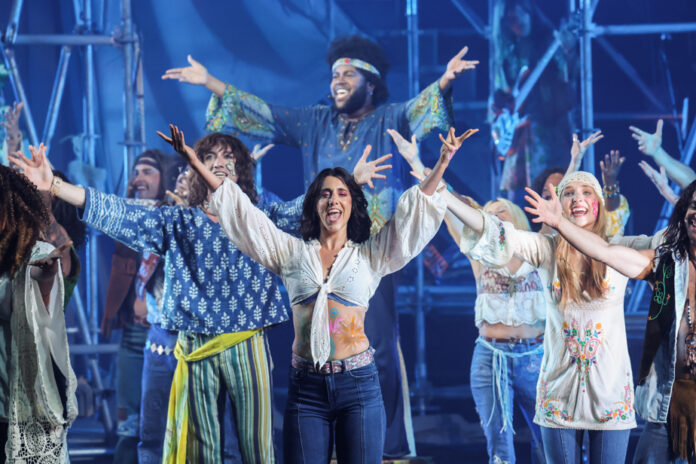There is joy these days at the Théâtre St-Denis. There hangs a scent of flowers of happiness, a hint of formerly illegal smoke, and how many pleasures are finally released, in an atmosphere of a big party.
As you will have understood, Hair, a cult work of the counter-culture and the hippie movement of the 1960s, is on the bill, in an imposing production, translated and directed by Serge Denoncourt.
How else to sum up this show, too long, let’s say it straight away, perfectly crazy, (un)breeky although without a big narrative plot, from which you can only come out with a smile on your face, because good, hard to escape a such an invitation in songs, in these gray and smoky days: “let’s let the sun in”, admit it? (Let the Sunshine In, yes, the songs of Gerome Ragni and James Rado, monster hits on Broadway, have been translated, except for certain refrains, and despite our apprehensions, it is taken quite well.)
Before going any further, a clarification. It should be noted that Monday evening’s performance was hit by a hell of a tile, unheard of in spectator memory, which however gave a second wind to the story: a power outage, about twenty minutes from the final. (of a show that still stretches over two and a half hours, intermission included)!
The case happened at a key moment, the tormented character of Claude Bukowski (Philippe Touzel), called to fight at the front in Vietnam, declaring that he wanted to be “invisible” (!). The hiatus lasted a good half hour, forcing a hasty evacuation of the theater, evacuation ultimately aborted, the electricity – sorry: the sunshine! – having made an unexpected comeback.
A twist, you say? Imagine for the artists, who had also just attempted a premature conclusion, singing seated on stage and in chorus, in the light of the cell phones of the united spectators, the famous sunny refrain. Let us salute their catchy improvisation, which gave rise to a surreal and magical moment, as only the living arts have the secret (or, in this case, Hydro-Québec!). End of the parenthesis (or the “bad trip”, in the text, at this precise moment too, we swear to you, it can’t be invented!).
If not, what to say? Don’t understand everything? Doesn’t matter. The narrative is secondary. Also refrain from reviewing the adaptation of Milos Forman (1979), a very good film by the way (adapted from a text first written for the stage, it should be remembered), but which risks mingling you more.
You may be looking for a long time there for the candid and well-groomed character of Bukowski, already disheveled (like all the other members of the cast, about thirty artists, if we counted correctly)!
Serge Denoncourt said he wanted to offer a “polaroid” of this bubbling (and smoky) era and its demands, both revolutionary and furiously pacifist, in favor of sex, drugs and rock and roll, liberated, we will have it Understood. And that’s exactly what he does, with a few nods to Quebec culture in addition, accompanied by Wynn Holmes and Nico Archambault on choreography, and Lorenzo Somma on musical direction. Its “polaroid” is also cleverly underlined thanks to a decor of scaffolding, a number of elephant legs and colorful scarves, and above all several projections, evoking sometimes the Statue of Liberty, sometimes a battlefield. Visually, it is very powerful.
It is also impossible to ignore the presence of the musicians on stage, a notable addition to the cast.
Don’t be surprised, after all, that’s the subject, also underlined in broad strokes (many pairs of buttocks, and as many joints). Special mention to all the group numbers (the majority), where singers and dancers perform in unison, very successful both rhythmically and visually.
On the other hand, and this is undoubtedly the other side of the coin, the texts are sometimes drowned here, as there are voices, precisely. This is probably why no character stands out from the lot either (note that there are no big stars either, but rather regulars in musicals) as there are so many of them, be it Philippe Touzel (in honest Bukowsi, no more, seen in Footloose), Kevin Houle (in prank George Berger, a bit more colorful, seen in Annie), or Éléonore Lagacé (admittedly dynamic Sheila Franklin, also from the cast of Footloose). Only Sarah-Maude Desgagné (from the latest vintage of Star Académie), as a powerful Dionne, succeeds here in giving us goosebumps, with her particularly heartfelt interpretation of Need a Friend (as a cover, at the end of the show!) .
Here is a show less polished and certainly more daring than what we have been used to just for laughs, in terms of musicals, we get along. We salute the audacity, because if the theatrical experience is less present, the musical and choreographic trip does not disappoint us.















